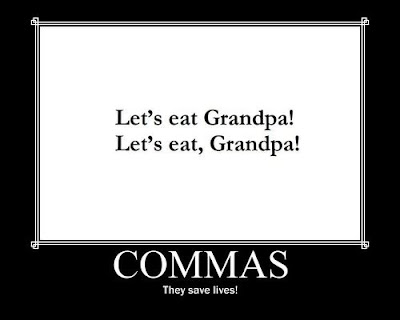
*BEEEEEP* This has been a test of the Emergency Comma System. Had this been a real emergency, you'd have a lot of explaining to do to Grandma.
 Recently I read The Book Thief by Markus Zusak. I thought it was excellent. It is one of those books that broadly encompasses the human experience. Literally, it made me laugh and cry.
Recently I read The Book Thief by Markus Zusak. I thought it was excellent. It is one of those books that broadly encompasses the human experience. Literally, it made me laugh and cry. In this blog I’ll hit some of the highlights (with no big spoilers).
Technically, The Book Thief is a young adult novel. But if someone hadn’t told me that, I wouldn’t have known. I think this is one of those great books that you could read over and over again, at different stages of your life, and get different things out of it each time. My 13-year-old neighbor told me students at his school read it. I hope he reads it too.
The Writing
As a writer, it’s hard not to love an author who describes characters like this:
I don’t know much about Markus Zusak, but the man has a gift for metaphor. I love that these descriptions are vivid, succinct, and hilarious all at the same time. Yet they also leave the character’s appearance mostly open to personal interpretation.
In this book, Zusak often describes non-physical things as if they were physical, and in doing so he brings them to life in a way I’ve seldom seen. Take this example:
When Liesel left that day, she said something with great uneasiness. In translation, two giant words were struggled with, carried on her shoulder, and dropped as a bungling pair at Ilsa Hermann’s feet. They fell off sideways as the girl veered with them and could no longer sustain their weight. Together, they sat on the floor, large and loud and clumsy.
* * *TWO GIANT WORDS * * *
I’m Sorry
The Narrator
The main character in The Book Thief is a girl named Liesel, who lives in a small town outside Munich during the 1930s and 1940s.
But the narrator is Death. He (she? we never learn) narrates the story in the first person. He describes what happens to Liesel and the other characters, but he also describes his own “job” of carrying away the souls of the recently deceased. It’s Germany during World War II, so as you might imagine, Death puts in some overtime.
I was both intrigued and amused to have Death as the narrator. From an author’s standpoint, it’s clever – what other narrator could be so all-knowing and all-powerful? Only God, I suppose (and if you look at it a certain way, they’re the same thing).
As a character in this story, Death is both supernatural and human. He relays the events without judgment. Judgment is not Death’s job. But he does describe being moved by human beings and the things they are capable of, even in times of great sorrow. At one point, Death mentions God. He says he asks God questions, but God never answers; he just sends Death his next assignment.
The Style
I liked that the story is presented without analysis (other than the colorful metaphors). Mostly it’s just the characters, scenes, and events, plain and bare for you to look at. A style like that forces you to feel your own feelings, relate the events to your own experiences, and form your own opinions.
One of the things I’ve learned about writing fiction is that sometimes it’s better to just lay things out for the reader to see, with no spin, no angle. Let the reader’s imagination do the work. It makes for a more personal experience for the reader. It also makes the story more about the reader than about the author, which is brilliant, when you consider the fact that most authors never meet most of their readers.
We talked about this book at a book club that I attended. I was struck by how different people’s impressions of the story were. Some people thought it was very sad and they didn't like it. Others thought it was wonderfully uplifting. Some readers thought the author was implying certain things that other readers did not. You could get the sense that the author was anti-war, yet you can't point to anything in the book that actually says that.
It was a good book club choice. It gives you a lot to talk about.
 Last time, I offered this rule of thumb for hyphens: If the phrase that you are tempted to hyphenate is the last thing in the sentence, don't hyphenate it. If it is not the last thing in the sentence, hyphenate it.
Last time, I offered this rule of thumb for hyphens: If the phrase that you are tempted to hyphenate is the last thing in the sentence, don't hyphenate it. If it is not the last thing in the sentence, hyphenate it. So I got my alderman's e-newsletter the other day.
So I got my alderman's e-newsletter the other day.